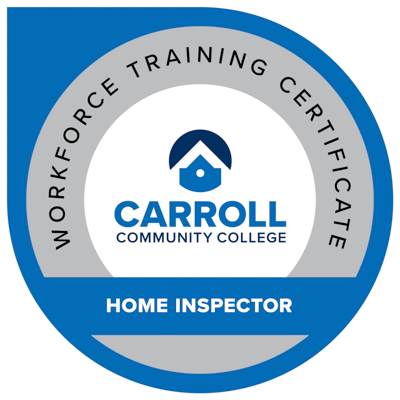Home Inspector Certificate

At a Glance
Turn an Eye for Detail into a Home Inspection Career
In our Home Inspector training program, you’ll gain a solid foundation in residential construction and learn how to assess every major home system. Through hands-on instruction, you’ll master the home inspection process, develop essential techniques, and learn to recognize defects that others might miss.
Schedule:
Offered Fall & Spring; classes meet twice a week in the evening
Next Start Date:
Jan. 12, 2026
Approx. Number of Hours/Months:
81 hours/3 months
Program Cost:*
$1,515 (includes textbook); Tuition Assistance Available
Certification Earned:
National Home Inspector (NHI)
Min. Occupational Requirements:
18 years old or older. Construction background preferred.
What You’ll Learn

In this hands-on workforce training program, you’ll build the knowledge and skills needed to perform professional home inspections. You’ll learn how to evaluate the condition of residential properties and communicate your findings with confidence.
Key areas of instruction include:
- Residential construction standards & processes
- The complete home inspection process
- Inspection techniques & defect recognition
- Assessment of key home systems, including:
- Roofing
- Plumbing
- Electrical
- Heating and air conditioning (HVAC)
- Insulation and ventilation
- Fireplace & solid burning
- Structural components (interior & exterior)
By the end of the program, you’ll be equipped to inspect homes, condos, apartments, and other residential dwellings, helping future homeowners make informed decisions.
Curriculum
This comprehensive training program combines classroom instruction with real-world applications to build your expertise step by step and prepare you for a career in home inspection.
View all current course offerings. Not all courses are offered within every term schedule.
Prepare for a career as a home inspector. Learn basic residential construction standards and processes, the home inspection process, and inspection techniques and defect recognition. Topics covered include the following systems: structural, exterior, interior, roofing, plumbing, electrical, air conditioning, insulation and ventilation, fireplace and solid burning, and heating. Includes tips on starting your own home inspection business. This course has been approved by the Maryland Commission of Real Estate Appraisers and Home Inspectors to provide the home inspector pre-licensing training required to receive a home inspector license in Maryland.
Licensure/Certification Earned
Upon successful completion of this training, you will be eligible to sit for the National Home Inspector Examination (NHIE).
Financial Assistance
Why Choose Carroll’s Home Inspector Training?
- Flexible Evening Schedule: Attend class just 2 evenings a week, making it easy to balance with work and weekend commitments.
- Access to Course Materials: Review all curriculum content anytime, with a textbook included in the cost of the course.
- More Than the Minimum: State certification requires 72 classroom hours of training; our program is 81 hours, giving you time to catch up if you miss a class.
- Practice and Support: Regular quizzes and practice activities help reinforce your learning and prepare you for the certification exam.
- Stamp of Approval: This program has been approved by the Maryland Commission of Real Estate Appraisers and Home Inspectors to provide the pre-licensing training required to receive a home inspector license in Maryland.
Career Outlook
Home inspection is a high-demand field that offers stability, flexibility, and the potential for strong income. Nearly 80% of homebuyers choose to have a home inspected before making a purchase, making inspectors an essential part of the real estate process.
The U.S. home inspection market is projected to reach approximately $25 billion by 2029, with a global market size expected to more than double from $1.31 billion in 2024 to $2.73 billion by 2033. This growth is driven by both increased housing demand and a growing awareness of the importance of professional property assessments.
Graduates of Carroll’s Home Inspector training program may pursue careers as:
- Residential Home Inspector: Conducts inspections of homes for potential buyers, ensuring the property is safe and up to code.
- Commercial Property Inspector: Inspects commercial buildings, such as offices, warehouses, and retail spaces.
- Environmental Inspector: Focuses on environmental hazards like mold, asbestos, and lead paint.
- Energy Efficiency Inspector: Evaluates homes for energy efficiency, often working with programs like Home Energy Assistance Program (LIHEAP) and Department of Energy (DOE).
- Insurance Inspector: Works with insurance companies to assess property conditions and risks.
- Construction Inspector: Ensures that new construction projects comply with building codes and regulations.
- Field Inspector: Conducts exterior inspections and reports on property conditions.
As the industry evolves, inspectors with specialized skills—such as drone use, thermal imaging, or energy auditing—are increasingly in demand. These advanced capabilities not only enhance job performance but also help professionals stand out in a competitive market.
- What is the National Home Inspector Examination for Maryland home inspector licensing?
The National Home Inspector Examination (NHIE) is a standardized exam required for home inspector licensing in Maryland and many other states. The exam evaluates core competencies in home inspection, including building systems, inspection practices, and professional responsibilities. Passing the NHIE is a required step toward obtaining a Maryland home inspector license.
- What qualifications do I need to enroll in a Maryland housing inspector certification program?
To enroll in Carroll’s Maryland Home Inspector training program, you must:
- Be at least 18 years old
- Hold a high school diploma or equivalent
Carroll’s program is approved by the Maryland Commission and fulfills the state’s 72-hour pre-licensing education requirement.
- Who should take this Maryland home inspector training program?
This training is ideal for individuals who have:
- Strong attention to detail and observation skills
- An interest in construction, building systems, or property evaluation
- A commitment to integrity, accuracy, and ethical practice
- Good communication and customer service skills
- What other requirements do you need to become a licensed home inspector in Maryland?
In addition to completing a state-approved training program, Maryland home inspector licensing requirements include:
- Passing the National Home Inspector Examination (NHIE)
- Maintaining general liability insurance of at least $150,000
- Submitting a license application approved by the Maryland Commission
- Paying the required $50 application fee
- How does this home inspector training program prepare me for the Maryland home inspector licensing exam?
Carroll’s Home Inspector training program prepares students for licensing by:
- Covering residential construction standards and inspection techniques
- Teaching how to evaluate major systems, including roofing, plumbing, electrical, HVAC, insulation, fireplaces, and structural components
- Training students to recognize common defects and safety concerns
- Providing guidance on starting and managing a home inspection business
The program is approved by the Maryland Commission to meet the 72-hour pre-licensing education requirement.
- Are there continuing education requirements for licensed Maryland home inspectors?
Yes. After the first license renewal, Maryland home inspectors must complete 30 hours of continuing professional competency education every two years to maintain licensure. Courses must be offered by Commission-approved providers, and up to 30% of the required hours may be completed outside of a classroom setting.
Carroll offers approved Continuing Education courses in home inspection.
- Is financial assistance available for Maryland home inspector training?
Yes. This program is eligible for tuition assistance.
- What jobs can I get with a Maryland home inspector certification?
With a Maryland home inspector license, career options include:
- Licensed residential home inspector
- Independent contractor or owner of a home inspection business
- Property assessment consultant for real estate firms, insurance companies, or home buyers
- How much do licensed home inspectors make in Maryland?
Licensed home inspectors in Maryland typically earn between $62,000 and $77,000 annually, with experienced inspectors or business owners making more.
Earnings vary based on factors such as:
- Number of inspections performed
- Type of properties inspected
- Whether you work independently or for a company
Income estimates may vary based on experience, location, and business model.
Related Professional Skills & Job Training Courses
Get Started Today
410-386-8100 | wbce@carrollcc.edu | Building A, Room 115
*Unless noted, cost does not include any required textbooks and related materials, applicable licensing fees, background check fees, testing fees or prerequisite courses.